In this article:
Before the advent of modern medicine, many cultures around the world relied upon plants and herbs to treat and manage a variety of illnesses and infections. They were also used in preventative capacities in the form of teas or as an ingredient in food.
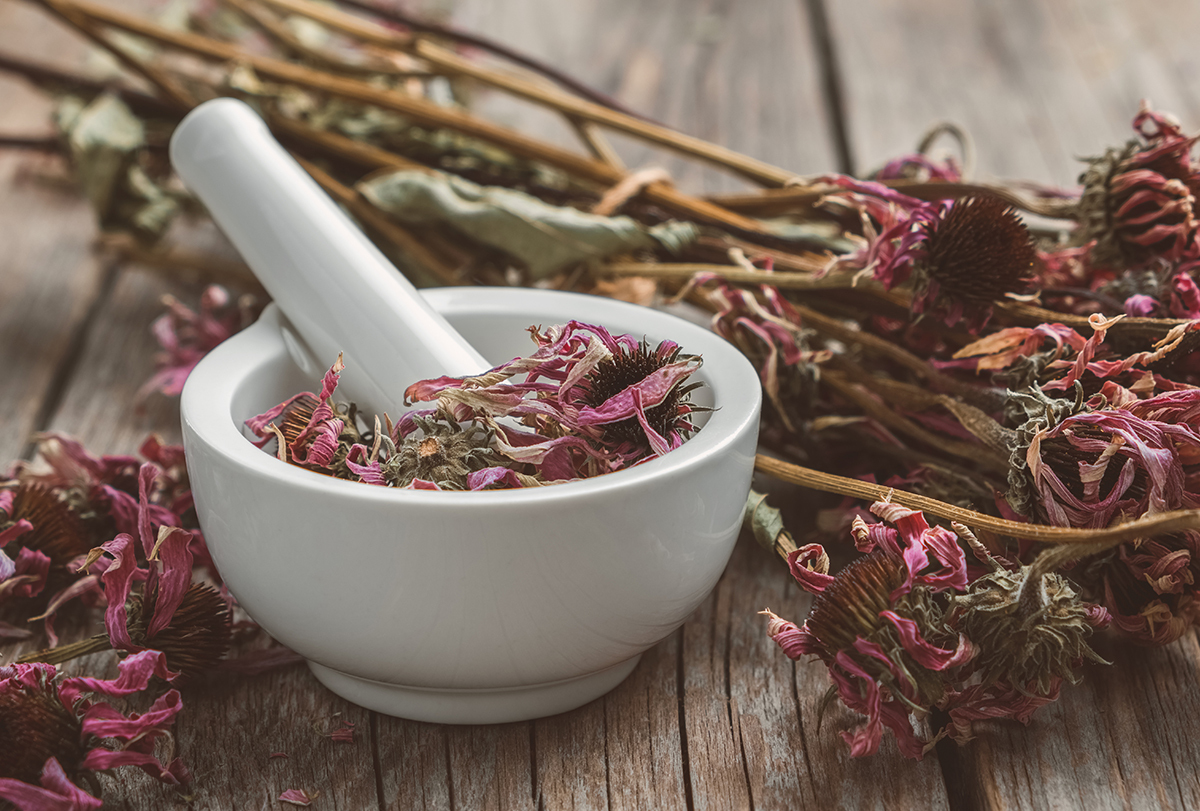
In today’s world, medicinal plants still hold a place of importance in traditional medicine. In fact, the advent of modern medicines can also be attributed to compounds derived and isolated from plants. (1)
At the start of the 21st century, the World Health Organization (WHO) classified 252 drugs as basic and essential, of which 11% were derived from plants. What you know as aspirin, morphine, some drugs that combat cancer, and drugs that fight diseases of the liver (silymarin) are all derived from plants! (2)
Most Powerful Medicinal Plants
Though the use of medicinal plants is heavily influenced by geography and culture, some hold value regardless of its native location.
The following are a few extremely potent medicinal plants.
1. Ginkgo
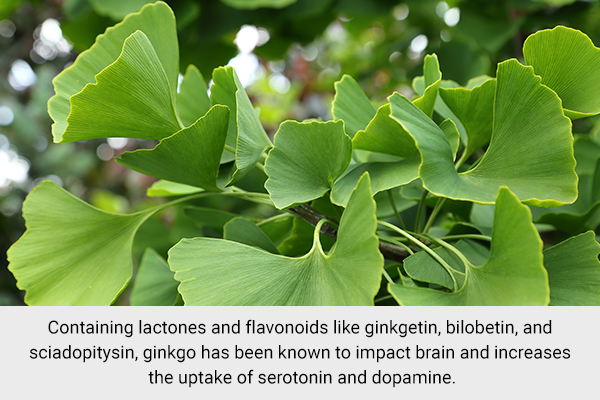
Ginkgo is a very popular herb worldwide. Containing lactones and flavonoids such as ginkgetin, bilobetin, and sciadopitysin, ginkgo influences brain function and increases the uptake of serotonin and dopamine (also known as the feel-good hormones).
It also provides a protective effect on nerves, and studies have found its long-term use to improve memory in middle age. It also protects against free radical damage. (3)
Other benefits of ginkgo backed by evidence include: (3)(4)
- Improving cognition
- Reducing the risk of heart diseases
- Improving mood disorders
- Reducing sexual dysfunction
- Reducing symptoms of vertigo
- Preventing the spread of vitiligo
- Improving macular degeneration
Ginkgo is available as supplement either by itself or combined with other herbs. The maximum dose of ginkgo extract is 240 mg/day. (3)
2. Turmeric
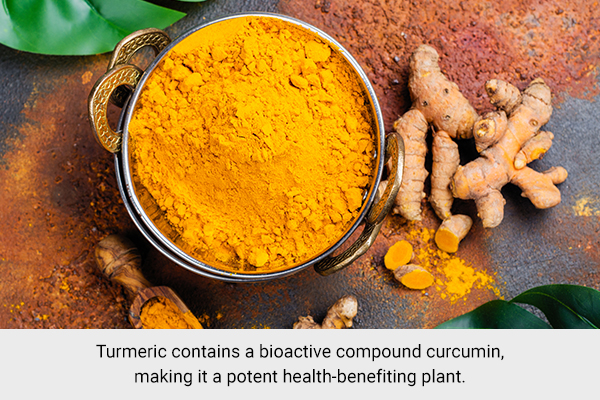
Turmeric is quickly taking a prime spot for its role in managing a variety of health conditions. Its main bioactive compound curcumin makes it a potent health-benefiting plant.
One main action of curcumin is its ability to reduce inflammatory substances in the body.
Since inflammation is a major risk factor for illnesses such as diabetes, Alzheimer’s disease (AD), Parkinson’s disease (PD), heart diseases, and even cancer, including turmeric in the daily diet or as a supplement can offer protection such as: (5)
- Managing diabetes
- Preventing the degradation of nerves to reduce mood disorders, dementia, Alzheimer’s disease, and Parkinson’s disease
- Protecting the liver against injuries and toxins
- Reducing the risk of heart diseases
- Reducing the risk of cancer
The ideal dose for curcumin may vary based on weight and why it is being used. You can use 1–2 tsp in your daily cooking or follow the dosage instructions specified in the supplements you take.
3. Ashwagandha
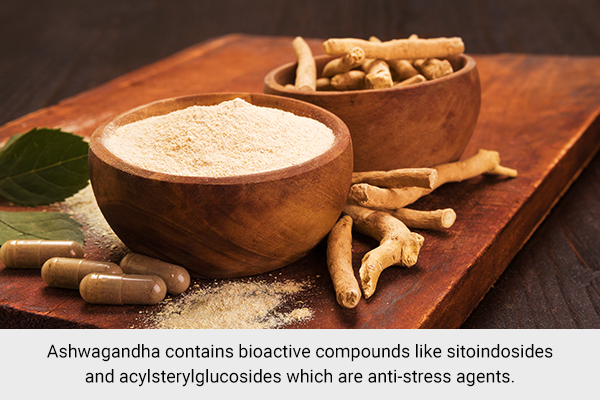
Ashwagandha, also known as “Indian ginseng,” is an important Ayurvedic herb. It is a strong adaptogen (increases the body’s ability to adapt to stress) and is commonly consumed as a powder either with water, mixed with ghee, or along with honey.
Ashwagandha contains bioactive compounds including sitoindosides and acylsterylglucosides, which are antistress agents. It has a strong activity to reduce cortisol (stress hormone) and its complications such as gastric ulcers and mood disorders, and it alleviates fatigue. (6)
Some other ways ashwagandha can help include:
- Promoting healthy reproductive balance
- Improving immunity
- Reducing free radical damage in the body
Newer studies have also identified the benefits of using ashwagandha in normalizing TSH levels in hypothyroidism. In a trial of 50 patients with hypothyroidism, 600 mg daily supplementation normalized TSH, T3, and T4 within 8 weeks. (7)
4. Tulsi
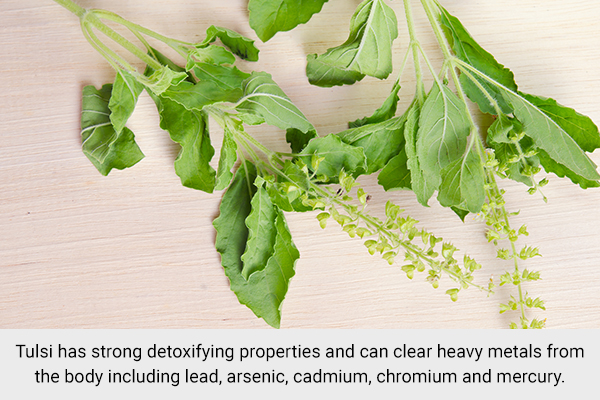
Tulsi, or holy basil, is an important plant in many Indian households. It is regarded as the “queen of herbs” and “mother medicine of nature” due to its strong health-benefiting properties. (8)
Tulsi is also considered an adaptogen like ashwagandha and helps the body adapt to stress. Multiple animal and human studies have shown tulsi to be useful for: (8)
- Preventing parasitic infections
- Treating respiratory conditions such as cough and improving symptoms of asthma
- Managing indigestion, diarrhea, and vomiting
- Treating insect, snake, and scorpion bites
In addition, tulsi has also strong detoxifying properties and can clear heavy metals from the body including lead, arsenic, cadmium, chromium, and mercury. (8)
Tulsi is most commonly consumed as tea. You can add 4–5 fresh tulsi leaves to boiled water and steep for 10 minutes.
Studies have identified 300–3000 mg of tulsi extract (as capsules) to be safe for consumption. (9)
5. Echinacea
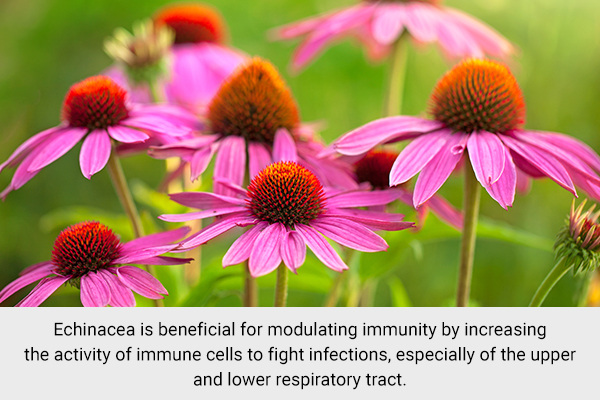
Echinacea is a well-known medicinal plant that is recently also available in syrup and medicinal preparations meant for respiratory diseases.
Echinacea is beneficial for: (10)
- Modulating immunity by increasing the activity of immune cells to fight infections, especially of the upper and lower respiratory tract
- Reducing inflammation in the body
- Providing possible antidepressive properties
- Preventing the risk of cancer
Echinacea is mostly consumed for respiratory illnesses, and 0.9 ml thrice a day (2,400 mg extract each day) is considered safe as a preventative dose. Studies recommend consuming the same amount but five times a day (4,000 mg each day) during an acute cold. (11)
Precautions to Consider
While most herbal plants have low to no toxicity unless consumed in large doses, caution must be exercised.
The efficacy of these supplements depends on the purity of the source. If the supplement is not approved by the FDA, it may be contaminated with additives or heavy metals causing more damage than good.
Furthermore, in cases of acute prolonged illness, consult a doctor immediately since herbal supplements often take much longer to show results.
Most-Asked Questions
Can I take these supplements every day?
When taken within the recommended dosage limits, it can be safe to consume the above-mentioned supplements daily. However, care must be taken to check for individual allergies or intolerances.
Can children be given these supplements?
The medicinal plants mentioned in this article are safe for children as well. However, caution must be exercised to check for allergies and the purity of the supplement.
Practical Takeaways
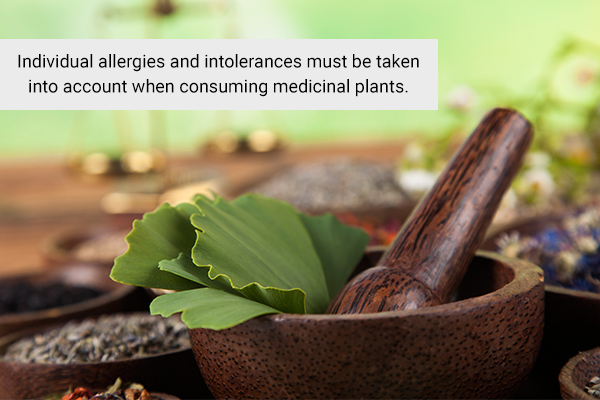
- Medicinal plants have been used to treat illnesses for many years.
- Ginkgo, ashwagandha, turmeric, tulsi, and echinacea are some of the most potent medicinal plants that offer many health benefits.
- Care must be taken to check the source of the supplement to ensure it isn’t contaminated with additives or toxins.
- Individual allergies and intolerances must be taken into account when consuming medicinal plants.
- Was this article helpful?
- YES, THANKS!NOT REALLY


